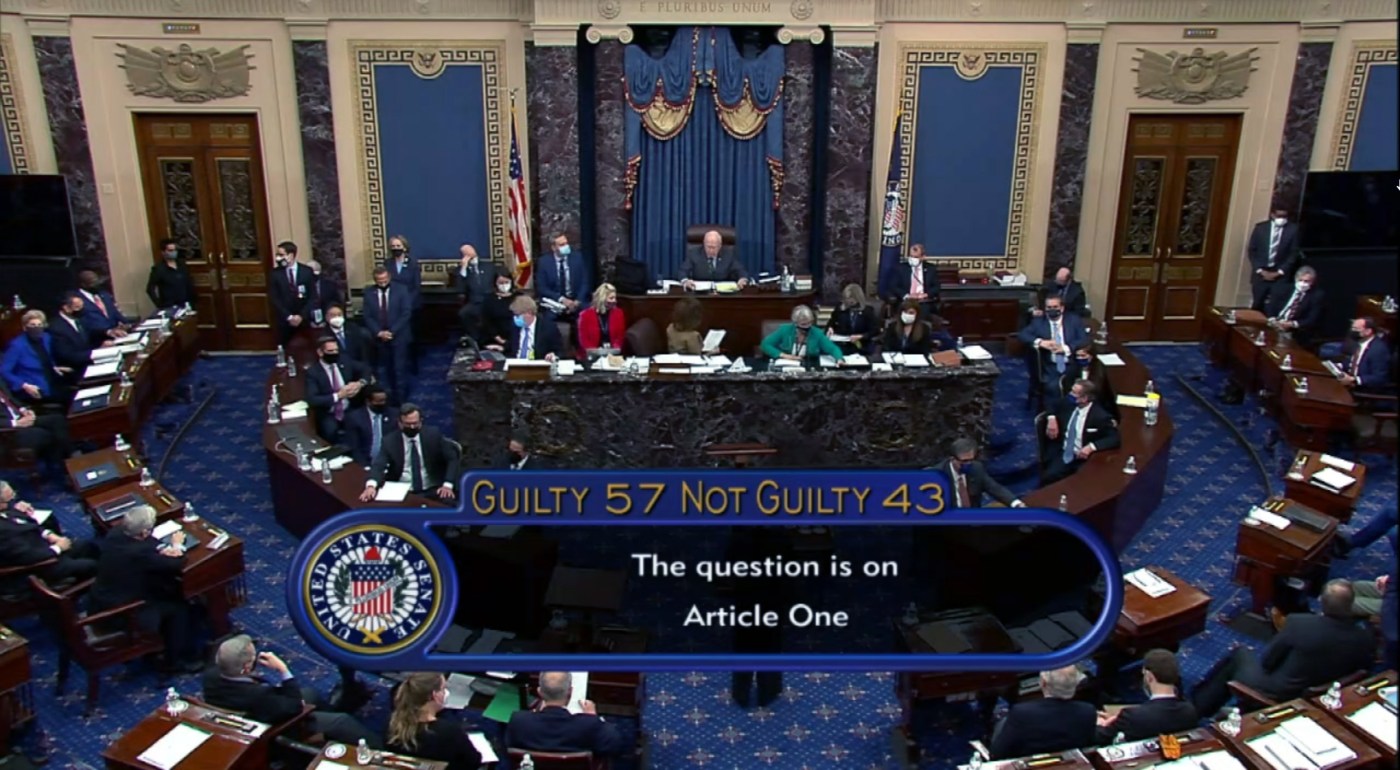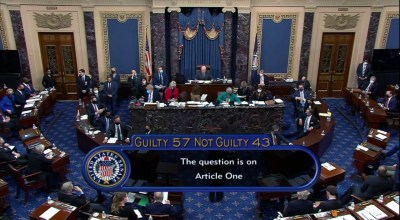After winning the Iowa caucuses with 51 percent of the vote and the New Hampshire primary with 54 percent of the vote, Donald Trump is on track to steamroll his last remaining 2024 GOP challenger, Nikki Haley, in South Carolina and in the Super Tuesday states. This development—alongside the doomed effort to disqualify Trump as a presidential candidate under the anti-insurrection provisions of the 14th Amendment—make it clear that the closest the former president ever actually came to being denied the 2024 GOP nomination was three years ago today, February 13, 2021, when the Senate came 10 votes short of convicting him following his second impeachment trial.
The failure to get two-thirds of the Senate to convict Trump—and a simple majority of the Senate to subsequently disqualify him from holding public office again—was not inevitable. It was a deliberate choice made by a number of Republican senators who believed Trump was responsible for the January 6 attack on the Capitol—or at the very least, knew that he was guilty of dereliction of duty that day.
We know the failure to convict and disqualify Trump was not inevitable because the Senate majority leader on January 6, Mitch McConnell, did not think it was inevitable in the days following the Capitol riot. As Jonathan Martin and Alexander Burns reported in their 2022 book This Will Not Pass, when McConnell met with two longtime advisers on January 11, 2021, he “told his advisers there would be at least seventeen Senate Republicans ready to affirm Trump’s impeachment, supplying the two-thirds vote needed to convict. Trump would already be out of office by the time the vote took place, but a conviction would mean he could be barred from running for office ever again.” McConnell indicated he would be among that group of 17 GOP senators, telling his advisers: “If this isn’t impeachable, I don’t know what is.”
McConnell’s view that Trump had committed impeachable acts was reported by the New York Times on January 12, 2021. But that same day, the conservative judge J. Michael Luttig published an op-ed in the Washington Post arguing that an impeachment trial conducted after Trump had left office would be unconstitutional. For at least a couple of reasons, however, Luttig’s reasoning was dubious. Not only was there historical precedent of impeaching and convicting former officials, but the theory that former officials could not be convicted would all but render the Constitution’s disqualification provision toothless: A president impeached 435-0 by the House in the middle of his first term could avoid disqualification simply by resigning.
Despite its flaws, Luttig’s legal theory was a politically convenient off-ramp that a majority of Senate Republicans, and McConnell himself, ultimately took on their way to acquitting Trump. A longtime McConnell adviser told Burns and Martin that the majority leader “saw [conviction] wasn’t going to happen,” and that he “wasn’t going to be a leader who stood with 15 percent of the caucus.”
Did Senate Republicans realize during Trump’s second impeachment trial that Trump would likely be the 2024 nominee if he wasn’t convicted and disqualified? “That’s a great question,” GOP Sen. Kevin Cramer of North Dakota, who voted against conviction, told The Dispatch in the Capitol last week. “I don’t think I did, because I couldn’t imagine why anybody would want to do this again after what he had gone through. That was a miscalculation of Donald Trump’s drive, obviously, for sure.”
Cramer said he thought the Senate lacked the constitutional authority to convict a former president, and also believed the article of impeachment—which focused on “incitement of insurrection”—was weak because those who rioted bore responsibility. Did he think there was a stronger argument that Trump was guilty of dereliction of duty? “Everybody from Don Jr. to Lindsey Graham [and] his family were reaching out saying ‘Do something, do something, say something. Get out there,’” Cramer recalled. “I think that was probably the biggest disappointment a lot of people had, was that while he wasn’t responsible for the event happening that he maybe could have persuaded people to stop sooner. But again, that responsibility still rests with the perpetrators themselves ultimately.”
GOP Sen. Lisa Murkowski of Alaska, one of the seven Republicans who did vote to convict Trump three years ago, told The Dispatch she “surely thought” at the time that a former president who had lost his re-election bid and been impeached twice “would kind of fade from the political headlines.” She wouldn’t say, however, if she believed her colleagues that voted against conviction were influenced by that same miscalculation. “I don’t know if it’s fair for me to ascribe what others were thinking,” Murkowski replied. Two other Republicans who voted to convict Trump in 2021 similarly declined to comment on the motives of GOP senators who voted to acquit. “I can’t opine on the perspectives of my colleagues,” Sen. Mitt Romney of Utah told The Dispatch. Sen. Bill Cassidy of Louisiana said: “I can only speak for myself.”
Still, Murkowski wonders if the trial’s outcome would have been different if it had been held immediately after January 6, rather than kicking off on January 26. “As with everything that seems to go on around here, with the passage of time, you start hearing kind of a different set of facts, if you will, or a softening of the actual events,” she said, pointing to “those on the outside who just say, ‘Well, that wasn’t that bad.’ You know, ‘I saw that quick video, and it wasn’t that bad.’”
“I was here,” Murkowski said. “I’m not going to reshape my facts.”
She survived her own re-election in 2022 thanks in large part to Alaska’s top-four primary and ranked-choice voting system, which facilitated a comfortable 7-point victory over a more pro-Trump Republican, Kelly Tshibaka, in November 2022. Three of the seven Republicans who voted to convict Trump—Pat Toomey of Pennsylvania, Richard Burr of North Carolina, and Ben Sasse of Nebraska—left office at the end of 2022, and Romney has announced he’s retiring at the end of this year. The two remaining Republicans who voted to convict Trump—Cassidy of Louisiana and Susan Collins of Maine—are up for re-election in 2026.
It wasn’t impossible to imagine a coalition of 17 Republican senators coming together in February 2021 to convict and disqualify Trump, but at least some of those senators would have needed to be willing to risk losing their Senate seats in primary elections. While Trump’s overall job approval rating dropped to an all-time low of 29 percent, according to a January 2021 Pew poll, even his worst polls should have made it clear to Senate Republicans he remained a dominant force in the party and the 2024 GOP frontrunner. That same Pew survey—conducted between January 8 and 12, 2021—showed that a solid majority of Republicans continued to support Trump, with 60 percent approving of his job performance and 37 percent disapproving.
A few GOP senators who voted to acquit Trump could have voted to convict without risking an electoral defeat: Rob Portman of Ohio, Richard Shelby of Alabama, and Roy Blunt of Missouri did not seek re-election in 2022. Add in McConnell and that would have been 11 of 17 GOP votes needed to set the Republican Party on a different path. But where would the remaining six votes come from? While there’s been some turnover since 2021, these lists of senators who have withheld their endorsement of Trump and who voted to advance a bill providing military aid to Ukraine against Trump’s wishes provide a good starting point.
Sen. Mike Rounds of South Dakota—who loudly disputed the former president’s stolen election claims in January 2022—is on both lists. “Three years ago, we weren’t sure what was going to happen [in the 2024 primary],” Rounds told The Dispatch. “It was pretty evident that whoever the next nominee would be would have a pretty good shot at taking back the White House for the Republican Party.” Rounds said he voted against conviction on the grounds that Trump was already out of office.
Sen. Todd Young of Indiana is on both lists, too. He forcefully objected to Trump’s efforts to overturn the election, but said in February 2021 that he voted for acquittal because it was “improper under the present circumstances for the former president of the United States to be subject to an impeachment trial.”
“I wasn’t thinking a lot about four years from now,” Young told The Dispatch when asked if he thought at the time that Trump would be the 2024 nominee. “I was just thinking about the here and now implications of that horrible day.”
Sen. Shelly Moore Capito of West Virginia, who is up for re-election in 2026, is another example of a senator who would have risked her seat if she voted to convict Trump. She represents a state that Trump carried by 39 points in 2020, but she squarely blamed him for the storming of the Capitol. “I think the president does own this,” Capito said in an interview on January 7, 2021. “He was using his power to convince [rioters] of a result that was never going to happen, which was to overturn the election and to force us into accepting that, into breaking our Constitutional duties.”
“It was horrifying,” Capito added at the time. “You look at these pictures and think, ‘Is that Beirut?’ ‘Is that Argentina?’ No, that’s Washington, D.C.”
When Capito voted to acquit Trump in February 2021, did she realize he would likely be the 2024 nominee? “I would say I never would have counted him out, so that is for sure,” Capito told The Dispatch last week. “I don’t remember really thinking one way or another, but I don’t find it surprising.”
“You don’t impeach somebody when they’re out of office,” Capito said of her vote to acquit. Would it have changed her view if Trump had been impeached on January 7 and faced a Senate trial on January 8? “I can’t say that because they didn’t,” she replied. “I don’t know.”
Despite her horror in the wake of January 6, Capito endorsed Trump’s 2024 re-election bid after he won the New Hampshire primary. “His policies of border security, international security, job security, growing [the] economy were good for my state. My state strongly supports President Trump too, that’s another factor,” Capito told The Dispatch when asked to reconcile her January 2021 comments with her 2024 endorsement. “I thought history would judge President Trump’s role in January 6—I have my own personal opinion—but I’m just looking at what’s better for this country in terms of policies.”







Please note that we at The Dispatch hold ourselves, our work, and our commenters to a higher standard than other places on the internet. We welcome comments that foster genuine debate or discussion—including comments critical of us or our work—but responses that include ad hominem attacks on fellow Dispatch members or are intended to stoke fear and anger may be moderated.
With your membership, you only have the ability to comment on The Morning Dispatch articles. Consider upgrading to join the conversation everywhere.